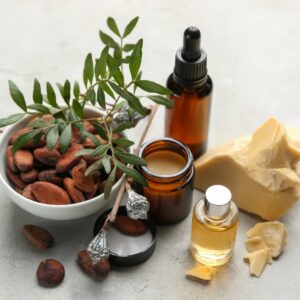
The Benefits of Using Natural Skincare Products For Sensitive Skin

Sensitive skin can be a real challenge to deal with when it comes to skincare. It can be difficult to find products that don’t cause irritation, redness, or inflammation.
- What Is Sensitive Skin?
- Causes And Characteristics Of Sensitive Skin
- What Are The Best Natural Ingredients For Sensitive Skin? (including 9 recommendations to get you started)
- Simple Skincare Solutions For Sensitive Skin
- How To Formulate Your Own Natural Skincare Products For Sensitive Skin
What Is Sensitive Skin?
Sensitive skin is a condition that affects millions of people around the world. It is characterized by a heightened sensitivity to products, environmental factors, and physical stimuli. People with sensitive skin may experience itching, stinging, burning, or redness when exposed to certain ingredients or environmental factors. Sensitive skin can be caused by a variety of factors, including genetics, hormonal changes, and lifestyle choices.
When diagnosing sensitive skin, dermatologists look for: skin reactions such as pustules, skin bumps or skin erosion, very dry skin, and (in lighter skin tones) a tendency toward blushing and skin flushing.
Causes And Characteristics Of Sensitive Skin
It is also tricky to identify the causes of sensitive skin because they are largely unknown, however below we list several potential causes of sensitive skin reactions:
Overly dry, dehydrated or injured skin:
This can lead to skin rashes and reactions.
Excessive exposure to environmental factors that cause skin damage:
Such as sun, wind and excessive heat or cold.
Allergic skin reactions:
Results from recurring exposure to an irritant or allergen that may result in an overactive response by the body’s immune system, often presenting itself as eczema, rosacea, or allergic contact dermatitis.
Overuse of detergents:
Avoid the temptation to over-wash, as it will strip the natural oils, fats and nutrients, which protect and keep the skin hydrated, balanced and healthy.
Poor diet or lifestyle choices:
For example, not consuming enough water, poor nutrition choices, poor personal hygiene, excessive stress or insomnia/lack of regular sleep, could all contribute to sensitive skin or eczema outbreaks.
Genetic factors:
This may also play a role in skin sensitivity and eczema; however further research is required on this subject.
Hormonal changes:
Hormonal fluctuations can cause changes in the skin’s sensitivity
The typical characteristics of sensitive skin can vary and can also be tricky to identify but they include:
Tightness and dryness:
Sensitive skin often lacks moisture and can feel tight or dry, especially after using certain skincare products or exposure to certain environmental factors.
Redness and irritation:
Sensitive skin may become red and inflamed due to irritants or allergens in skincare products, as well as exposure to environmental triggers such as pollution, wind, or cold weather.
Itching and flaking:
Sensitive skin may also experience itching and flaking due to dryness and irritation and may be exacerbated by harsh ingredients or fragrances in skincare products.
Rashes and bumps:
Sensitive skin may develop rashes, hives, or bumps in response to certain ingredients or environmental factors. These may be localized to certain areas of the body or may occur more widely. Sun sensitivity: People with sensitive skin may be more prone to sunburn and other adverse reactions to sun exposure, as their skin may be more vulnerable to UV damage. It’s important for people with sensitive skin to use sun protection and seek shade during peak sun hours to avoid further damage
Latest Post


Why Handcrafted Skincare is Better for You

How to Build the Perfect Skincare Routine with Caeri Beauty

The Benefits of Shea Butter for Your Skin

How Herbal Healing Inspires Our Skincare Line


